Rivera Sun's Blog: From the Desk of Rivera Sun, page 18
January 5, 2018
The Empire Has No Clothes
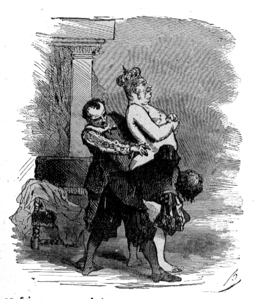
By Bertall (1820 – 1882);Sapcal22 at fr.wikisource (Transferred from fr.wikisource) [Public domain], from Wikimedia Commons
An Essay of the Man From the Northby Rivera Sun
The empire has no clothes. Be the boy who dares to speak the truth: there is no democracy. All around you, the courtiers are clapping and cheering, but their trembling hands are showing. They are terrified to admit the truth. There is no democracy in the US empire; rich people and corporations run the show. Study after study has shown this. The courtiers of power have been applauding the empire for so long, they’re afraid to speak the truth. But you cannot afford to let yourself be fooled. The empire has no clothes. There is no democracy in the Unites States.
The clever tailors have done their legwork. They have millions of people convinced. The empire stands naked, clothed only in the hype, rumors, lies, platitudes, empty speeches, false words, and illusions about democracy. On the left of the empire stands the Democratic Party. On the right stands the Republicans. In between them is the naked empire, cloaked in the finest “robes” of lies and buzz words. It is a hideous, terrifying sight. Parts of the naked empire are bloated. Others emaciated to the bone. Sores fester. Wounds bleed. Pustules burst. The empire stands rank and deluded – even those whose eyes are open wish we could cover up this shame.
Those clever two-party tailors (and the empire) have convinced everyone that we must applaud the non-existent democracy or you’ll have your head chopped off. The executioners wear the hooded masks of our fears: terrorists, foreigners, immigrants, tree-huggers, liberals, conservatives, racists, bleeding hearts, poverty, taxes, economic collapse, police, bankers – the list is endless and ever-changing. It serves to keep up terrified into playing the two-party game. That’s the trick to executioners’ hoods: they hide the truth. Anyone could be underneath that mask, and the clever tailors have us each hoodwinked by our fears.
Frightened, we play along. We clap our hands for the naked empire. We pretend it still has democracy. We keep repeating what the courtiers of power say: get out and vote, call your reps, sign petitions. If the empire actually had clothes, if it actually had a shred of functional democracy (or decency) left, then these actions would be as sensible as admiring the fabric of a new coat or the lace trim on a sleeve. Perhaps not enough, given the circumstances of the multiple crises crashing into our lives, but not delusional. Unfortunately, the practices of democracy are no longer grounded in any functional truth.
The clever tailors of the two-party system are profiting from maintaining the charade. They’re growing rich by convincing us that it’s democracy they’re weaving on their loom, stitching together with candidates and platforms, hemming and hawing about in congress and committees. They’re pantomiming an incredible show, snipping at nothing and sewing up hot air. And the mighty empire is nodding its head. After all, this charade is all that keeps the people quiet. This illusion of democracy keeps the people from revolting. It stops us from joining nonviolent movements for change. It keeps our resources of time and money caught up in buying the two-party tailors invisible thread and see-through fabric in which to drape the empire. The show keeps us from putting our own hands to the warp and weft of democracy and from picking up the needle, thread, and scissors. We could be determining the pattern and style of our political process. We could be crafting a type of democracy that fits our collective body politic. But the clever tailors have stolen the show. Their ruse keeps us from taking power.
Dare to be the boy who calls the bluff. Say it clearly: the empire has no democracy. Get up in the morning and remind yourself – you can be sure that many will try to convince you otherwise throughout the day.
From this essential admission of the honest truth, we must go to work. We must use the tools of nonviolent action to change the fabric of the nation. Thread by thread, we must weave and spin, trim and stitch, hem and cut this nation into the style of politics we need.
You may find, in this process, that the empire itself comes unraveled. The two-party tailors collapse. The courtiers spin in confusion and squawk in fear. The hoods of the executioners come off. Hold fast. Stay focused. Keep creating true democracy. Sew the clothes on your own back. Let our communities wear the mantle of democracy, all of us, together.
______________
The Man From the North is a fictional writer in Rivera Sun’s novel, The Dandelion Insurrectio n. The novel takes place in the near future, in “a time that looms around the corner of today”, when a rising police state controlled by the corporate-political elite have plunged the nation into the grip of a hidden dictatorship. In spite of severe surveillance and repression, the Man From the North’s banned articles circulate through the American populace, reporting on resistance and fomenting nonviolent revolution. This article is one of a series written by The Man From the North, which are not included in the novel, but can be read here .
Author/Activist Rivera Sun, syndicated by PeaceVoice, is the author of The Dandelion Insurrection and other books, and the cohost of Love (and Revolution) Radio.
December 27, 2017
Review of The Roots of Resistance
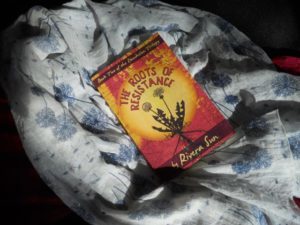 Review by Tom Hastings. Note: The Roots of Resistance will be fully released in Spring 2018. Thanks for everyone’s support of the early Author’s Editions through our Community Publishing Campaign.
Review by Tom Hastings. Note: The Roots of Resistance will be fully released in Spring 2018. Thanks for everyone’s support of the early Author’s Editions through our Community Publishing Campaign.
Rivera Sun caused quite a big stir in the relatively small but passionate world of nonviolent resistance with her 2013 extrapolative fiction, The Dandelion Insurrection and again with her 2016 magical novel, The Way Between. Her latest, The Roots of Resistance, tops those two popular earlier efforts in several ways, most strikingly, Sun’s far more sophisticated weave of the most important yet often arcane elements of the theory and practice of strategic nonviolence seamlessly into a plot that draws the reader along.
Full disclosure: Sun is a friend and colleague in the national and international community of those who educate, train, and practice nonviolent campaigning. I’ve reviewed the above-mentioned works favorably and we (my students and I) have twice brought her to speak and train at our university. I was an early manuscript reader of the first portion of this book. It will be one of the required texts in my summer course, Peace Novels. Like another of my favorite fiction writers, Barbara Kingsolver, Sun writes engagingly and packs her narrative with eye-opening action verbs and sparkling figures of speech as well as those cliff-hanging chapter endings that make it impossible to stop reading.
The reader is advised to read the precursor, The Dandelion Insurrection, if possible, so all the characters and the outcome of that story are known at the beginning of this new book. The story of this book can stand alone but why cheat yourself?
The plot commences after the Dandelion Insurrection–a version of people power in some ways similar to the one that ousted Ferdinand Marcos in the Philippines in 1986–has successfully brought down a corrupt and violent administration. During a mass celebration of that victory, a gratuitous drone attack slaughtered many, including one of the elder leaders of the Dandelion Insurrection, mother of one of the two young core leaders. After a period of mourning, unctuously “led” by the Interim President, the Dandelion Insurrection leadership sees no legitimate change in poverty rates, polluting extractive industries, and other social bads. Switching out one elite leader, they realize, is not enough.
As they organize to address this by pushing a major piece of federal legislation meant to radically alleviate some pressing problems, hidden forces are organizing to destroy the movement in several ways. At each juncture, Sun realistically creates problems and solutions, deepening problems, evermore creative ripostes. Her grasp of what really happens informs her tale of what really might happen.
Without a shred of the pedantic, Sun artfully weaves in the explanations of the theories of strategic nonviolence, making the novel a teaching tool. Some of the challenges to real life campaigns she manages to thread into her narrative include, but are not limited to: mainstream media, recruitment, tactical sequencing, technology hacking, violent flanks, systemic cooptation, de-escalation, gender, generational alienation, rumor control, fake news, movement preservation under brutal repression, agents provocateurs, romantic meddling, leaderless v leaderful, coalitional coherence, decision-making, nonviolent discipline, backfire, and transparency.
If you are a male raised in the US you might wish to read this book in a private place so no one can see the times you might come close to crying at the clarity of conscience and pain of pressures inextricably intertwined in the lives of the insurrectionists. Sun brings them to life and their lives become important, with events roiling so swiftly that at some point you just stay up reading it way past your bedtime.
With its understated humor providing relief from the aneurysm-serious topics, we can smile or even laugh now and again. For example, I loved this passage, late in the book as we have gained familiarity with so many characters, including the entire public elementary school trained so well in nonviolent resistance they enlisted the help of the local police to evict the hostile corporate takeover privatizers:
The police chief stared balefully at the students, teachers, and families, and exhaled in a long sigh. He respected Idah Robbins, but she stirred up trouble for justice like a favorite cocktail after work. He sometimes wished he had a normal hobby like crocheting or marathon running.
Billed as “Book Two of the Dandelion Trilogy,” this one makes me hope Sun is punching out Book Three soon and perhaps, like Douglas Adams, will give us, someday, Books Four and Five of the Trilogy.
~~reviewed by Tom H. Hastings, Conflict Resolution Assistant Professor, Portland State University.
December 16, 2017
Hooray! We did it! Congrats and thank you to everyone!

Thank you. Thank you.
Thank you.
Congratulations to everyone!
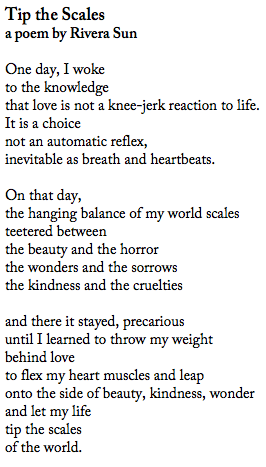 This is a moment for gratitude. (And happy dances!) With your support, we reached and exceeded the goal of The Roots of Resistance’s Community Publishing Campaign. Thank you from the bottom of my heart. This helps bring all kinds of amazing writing into the world this year, along with The Roots of Resistance. And, on top of all that, it keeps me healthy, alive, kicking, dancing, and writing. I am deeply grateful to all of you.
This is a moment for gratitude. (And happy dances!) With your support, we reached and exceeded the goal of The Roots of Resistance’s Community Publishing Campaign. Thank you from the bottom of my heart. This helps bring all kinds of amazing writing into the world this year, along with The Roots of Resistance. And, on top of all that, it keeps me healthy, alive, kicking, dancing, and writing. I am deeply grateful to all of you.
Please note: it is still possible to get a copy of the book until Sunday night at midnight Pacific Time. Here is the link:
https://www.indiegogo.com/projects/the-roots-of-resistance#/
I also want to thank everyone who helped in non-monetary ways with this book. It took a whole ecosystem of people. People have inspired characters, shared real-life dandelion-esque stories of creative resistance, taught me about issues that wound up in the book, caught typos, offered early feedback, cheered me on, healed me up, shared about the novel, posted my essays and articles, and so much more!
This year’s poetry chapbook is called “Tip the Scales” from the poem above. I feel like all of you are continuously making courageous choices to throw the weight of your life onto the scale of peace, justice, kindness, beauty, and life. Being a Community Supported Writer is a leap of faith onto this scale. I leapt in complete trust that I would find you all beside me … and there you were! Thank you!
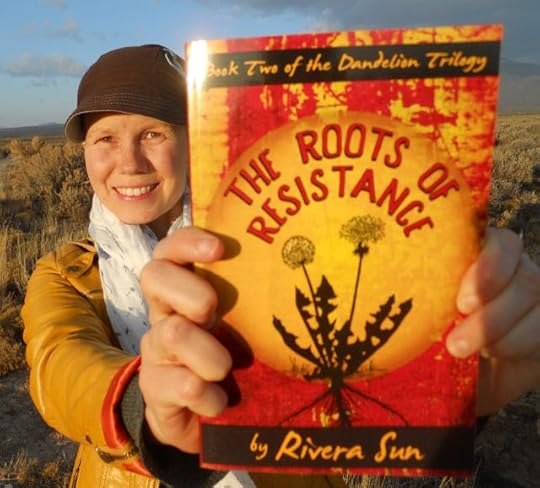 This theme, by the way, is a core plot twist of one of the new pieces of writing you have helped make possible in 2018: Hope at the End of the World. I am so excited to get to dust off this beautiful manuscript and share it with all of you. This coming year of writing will be extraordinary: hope, courage, spirit, heart, love, creativity, resistance, persistence, and maybe even a little laughter along the way.
This theme, by the way, is a core plot twist of one of the new pieces of writing you have helped make possible in 2018: Hope at the End of the World. I am so excited to get to dust off this beautiful manuscript and share it with all of you. This coming year of writing will be extraordinary: hope, courage, spirit, heart, love, creativity, resistance, persistence, and maybe even a little laughter along the way.
So, thank you to all of you for giving us all something to look forward to in 2018. Thank you for keeping me writing, for enjoying the new novel, and for leaping onto the scale of what’s beautiful and invigorating in this world.
Love and deep gratitude,
Rivera
December 15, 2017
Blockade the Gangplanks on the Titanic

By Willy Stöwer (1864–1931) [Public domain], via Wikimedia Commons
An Essay of the Man From the Northby Rivera Sun
Blockade the gangplanks of the Titanic! Shut down the boilers of the ship! Storm the stairs from steerage and seize the wheel!
We have passed the point where token victories, small handouts, and crumbs from banquet tables will help us. We have struck too many icebergs and the hull of our society has been breached. Band-Aids on shredded steel will not hold back the floodwaters of injustice.
We are standing on the sinking Titanic. The politicians are huddled in half-empty lifeboats, refusing to come back. They built the ship that’s sinking. They mocked the worrywarts who pointed out the lack of lifeboats. They raced full throttle through the dangerous waters, ignoring the looming icebergs of climate change, poverty, economic collapse, growing inequality, fascism, mass surveillance, imperialism, racism, the police state, monopolistic domination, and more. The list of icebergs is too long . . . and we’ve crashed into them all. We are screaming on the deck, pounding on the windows, thrashing in the black icy waters . . . or drowned in steerage class, silent and entombed.
The left blames the right. The right accuses the left. Each tells us that if they were in charge, this disaster would never have happened.
But they were in charge. Every step of the way, the left and the right were in charge. The disaster happened. They built this ship that’s sinking. Stuffed with arrogance and greed, they plowed us all to our demise.
Truth is hard. It hurts. It terrifies. But, unlike comforting lies, the truth might set you free. The truth might save our lives.
You must break through the delusion that the oligarchs and corporate pawns will save us. You must starkly confront the terror that all the wealth, power, momentum, steering wheels, boiler rooms, and engines of our nation are in the hands of greed-deluded madmen and fortune-drunk madwomen. You must drop the wishful thinking that they will regulate the Titanic or enforce safety measures or turn a different direction or slow down or fix the ship.
We must save ourselves.
We must organize to blow the whistle on the flawed design plans. We must educate each other of the dangers. We must organize the dockworkers to refuse to load the ship. We must come en masse to block the gangplanks. We must boycott the tickets. We must tell our friends and neighbors to stay off the ship.
Or, if it is too late, if we find ourselves on this metaphorical Titanic, miles out to sea, then we must refuse to load the boilers in the engine room. We must rise up from the lower decks and seize the wheel. We must disrupt the oblivious party on the first class deck. We must slow the ship to navigate the disasters of these waters.
Bend the metaphor further. Bend it to breaking point. Dissect the anatomy of disaster. Pick through the pieces of the wreckage of history and learn! Our survival depends on it. How many people must drown in the icy waters before you will drop the comforting lies? Stand and face the truth.
The wealthy politicians and corporate pawns on the left and the right are striking up their marching bands and plastering the town with their posters. They call their ideas unsinkable. They sell us tickets to their Titanic. They want us to believe that if we vote them into power, somehow their flavor of greed will be more palatable as we sink. They promise to reward us by putting us in their lifeboats while the rest of the nation drowns – don’t make that devil’s pact.
The truth is hard. The truth is painful. The truth is terrifying. But the truth will set you free.
Here is the truth: we must save ourselves. For, if we keep stoking the furnaces of the rich and powerful, we will plow into the final iceberg, sink into the frigid waters, and drown.
____________
The Man From the North is a fictional writer in Rivera Sun’s novel, The Dandelion Insurrectio n. The novel takes place in the near future, in “a time that looms around the corner of today”, when a rising police state controlled by the corporate-political elite have plunged the nation into the grip of a hidden dictatorship. In spite of severe surveillance and repression, the Man From the North’s banned articles circulate through the American populace, reporting on resistance and fomenting nonviolent revolution. This article is one of a series written by The Man From the North, which are not included in the novel, but can be read here .
Author/Activist Rivera Sun, syndicated by PeaceVoice, is the author of The Dandelion Insurrection and has just launched the sequel, The Roots of Resistance.
Net Neutrality: Gandhi’s Salt For US
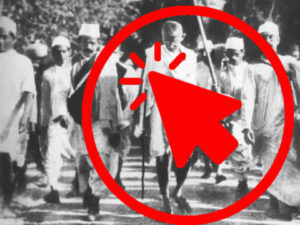
This image was brought to you thanks to Wikimedia and Creative Commons CCO License.
Net Neutrality is the keystone issue in the movement of movements. It is poised to become as pivotal to our interconnected struggles as the Salt March was for Gandhi and the Indian Self-Rule Movement.
This week, the FCC repealed Net Neutrality rules in blatant disregard of the 83 percent of US citizens who declared support for Net Neutrality. Overlooked for years, often misunderstood, Net Neutrality is as ubiquitous to our lives as salt was to Gandhi’s India. And the corporate state, our version of the tyrannical British Empire, might have just blundered into their undoing.
The end of Net Neutrality is as odious to us as the British Colonial government’s monopoly on salt was to the Indians. Salt was an essential ingredient for preserving life and health in humid, pre-refrigeration India. Net Neutrality and classifying the Internet as a public utility is essential for fair, affordable, and equal access to the Internet, and thus, the life of US citizens, as well as our innovation, creativity, information, education, research, marketplace, exchange, dialogue, organizing, and so much more.
Telecom giants like Comcast and Verizon have sought the end of Net Neutrality for years. This allows them to create a two-tiered system of Internet access, charging people for “fast lanes” and relegating everything else into “slow lanes”. The chilling effect this will have on our economy, research, movements, and society is incalculable. It is a massive advance for the corporate state’s takeover and privatization of all sectors of our nation. With it, they can control everything we see (or don’t see) through their greed. Money buys society in the capitalist world. For years, the Internet has opened up arenas of public space beyond what money can buy. The sheer volume of non-commercialized creativity and information online is staggering. It matches the incredible resources of the early commons. And, like the commons, the greedy have found a way to enclose them and charge us more and more for access.
Gandhi’s Salt Campaign offers us a model of how to get out of this mess – not just from the odious injustice of the end of Net Neutrality, but also from the tyranny of corporate rule. In 1930, salt was a keystone, yet stealth issue. When the Indian National Congress tasked Mohandas K. Gandhi with planning a new campaign against the British Empire’s colonial rule, no one expected the Salt Satyagraha would unravel the empire that the sun never set upon. Even Gandhi’s buddies were skeptical about salt. As for Lord Irwin, Viceroy of India, he famously stated that he wouldn’t lose any sleep over salt.
Instead, he lost the country.
Salt was an unexpected issue, but it touched every Indian citizen’s life. And, when Gandhi announced that he was going to use civil disobedience to directly disobey the “odious salt laws” and render them unenforceable through mass noncooperation, millions of ordinary Indians cheered. In defiance of the salt laws, they made, sold, and bought salt. Even more importantly, they openly refused to obey the British Empire and thus ousted the Brits from authority. This showed the Indians what Gandhi had been saying for decades: a paltry hundred thousand British cannot rule over 320 million Indians without the Indians cooperation. Deny your support, and British rule will crumble.
Fast forward to contemporary United States, which also has 320 million people and faces a parallel of colonial rule in the corporate state. In the case of telecom giants like Verizon and Comcast, well, they’re enjoying a monopoly on our modern-day salt of Internet access. With the repeal of Net Neutrality, they’re positioned to do like the British and start charging us for something we need for everyday life and survival.
But we can pull a Gandhi and make salt.
The Salt Satyagraha combined what’s known as constructive program and an obstructive program of civil disobedience to unjust laws. The Indians made salt (constructive) and broke the law en masse (obstructive). They marched, demonstrated, protested, wrote essays and made speeches about salt, using those acts of protest and persuasion to connect the issue of the salt laws with the need to end British rule.
We can do the same with Net Neutrality. We can “make salt” by supporting and building out local community broadband. This is already being done in many poor rural and urban communities that were ignored and marginalized by telecom giants seeking bigger profits in wealthier areas. Support this effort. It is needed in both the short and long term for breaking the telecom giants’ monopolies and putting more diverse and democratic control into our Internet.
We can defy en masse the corporate state’s attempt at colonial exploitation of US citizens. Governor of Washington State Jay Inslee just announced a plan of action to uphold Net Neutrality standards in defiance of the FCC. California Senator Scott Wiener plans to introduce similar legislation in January. Support a similar effort in your state. These will be vitally important in reinstating Net Neutrality not just through the FCC, but as a long-term industry standard.
We can also pressure our Congress Members to use the Congressional Review Act to pass a “resolution of disapproval” that overturns the FCC decision in the next 60 days. We can also support the state-led lawsuits against the FCC.
Perhaps most importantly, we can connect the issue of Net Neutrality with the bigger problem of corporate control. In our protests, marches, demonstrations, online posts, articles, and discussions we need to make the connection known: we are being ruled over by a corporate state that has ended citizen democracy in the United States. If, like Gandhi and the Indians, we wish to cease being a colony (of corporations in our case) and implement democratic self-rule, we need make sure every one of our fellow citizens sees the repeal of Net Neutrality as a symbol of the greed and corruption of corporate rule.
The struggle ahead of us is challenging . . . and vitally important to our lives. Take heart from the example of salt. Use it to take action today. When we organize, we win, as Popular Resistance founders and Net Neutrality campaigners Margaret Flowers and Kevin Zeese say.
Net Neutrality is our salt. Let’s use it to end corporate rule.
—————
Author/Activist Rivera Sun , syndicated by PeaceVoice , is the author of The Dandelion Insurrection and has just launched the sequel, The Roots of Resistance.
November 26, 2017
Censorship: the Death Knell of Democracy

Creative Common CCO; Support the Commons & Protect Net Neutrality!
An essay of the Man From the North
by Rivera Sun
Censorship is the foe of freedom. It comes in many forms. The choking grip of control silences dissent. The bullhorns of propaganda blare out lies and fictions of consent. The maddened clench of greed stifles outlets for a diversity of expression, creativity, opportunity, and invention. The lurking spies of mass surveillance send chills down once-fearless spines. The data collectors of corporations mine our lives for ways to shrink-wrap our world views into commoditized sales pitches.
We think of censorship as cutting off a voice or silencing an outspoken dissenter. It is much worse . . . censorship today happens at every level of society from our minds to our platforms to our search engines. We dream in tight little boxes of permissible ideas. We speak only what others wish to hear. We gain access to platforms only by conforming to comfortable lies. If an uncomfortable truth manages to leap the hurtles and reach the outer rim of a listener’s ears, then the listener quickly brushes it aside, dismissing it as conspiracy or nonsense. The totalitarianism of our censorship happens inside each person. Critical thinking skills are shut off and intellect is replaced with blind conformity and dogmatic loyalty to patriotism, religious ideology, and brand names.
This happens on all sides of the political spectrum. It is the death of democracy. Without dissent and discourse, freedom is a hollow word. Without freedom, there can be no honest democracy. At the trial of democracy’s murder, it would be found that a lynch mob beat it to death. The corporate media is guilty. The telecom and tech companies that manipulate search engines and unequal Internet speeds are guilty. The corporations are guilty. The politicians are guilty. And we are guilty.
In an era of uncomfortable truths, the choking of truth is the strangulation of our lives. If we cannot speak about catastrophic, man-made climate change; or the concentration of wealth and simultaneous economic collapse that is impoverishing millions; or the corporate and oligarchic takeover of our country; or the creeping and pervasive spying of the mass surveillance apparatus; or the propaganda and control of corporate advertising; if we cannot speak of and challenge these things, we will continue to die of these injustices. Our death knell is a resounding silence built of censorship and the shrieking sales pitches of profitable lies.
Every human possesses the skills to resist this. We were each born with the ability to shout out that the emperor has no clothes. To speak truth in a time of lies takes courage, but not superhuman powers. We must listen and speak truth. We must discourse – not dismiss – one another. We have to build the means of honest communication. Democracy can be resurrected by breaking silence and listening to complex, uncomfortable truths. Tear your eyes away from mind-numbing sales pitches. There is more to life than blind consumption. We are humans, not locusts. The life of our Earth, our communities, and ourselves, depend on our willingness to break through the many facets of censorship and let truth, freedom, and democracy arise.
_________________
The Man From the North is a fictional writer in Rivera Sun’s novel, The Dandelion Insurrectio n. The novel takes place in the near future, in “a time that looms around the corner of today”, when a rising police state controlled by the corporate-political elite have plunged the nation into the grip of a hidden dictatorship. In spite of severe surveillance and repression, the Man From the North’s banned articles circulate through the American populace, reporting on resistance and fomenting nonviolent revolution. This article is one of a series written by The Man From the North, which are not included in the novel, but can be read here .
Author/Activist Rivera Sun, syndicated by PeaceVoice, is the author of The Dandelion Insurrection and has just launched the sequel, The Roots of Resistance.
Gratitude for the Adventure Called Life
Tis the season to talk about gratitude. And turkey. And colonialism, Indigenous peoples, Buy Nothing Day, Shop Local, consumerism, capitalism, and the growing list of ways humanity will come to an untimely demise. I’m going to leave all that aside for a moment. In other years, I’ve had a mouthful of opinions along with my vegan Thanksgiving. This year, I have only gratitude.
 There’s nothing more humbling than nearly dying and realizing you are simply grateful to just be able to show up at this moment in human history on this beloved Earth. Yes, the world is a mess. Yes, there is a mile-high stack of injustices looming. But, I’m struck by the stark fact that this brush with cancer meant I almost lost my chance to be here in all of the beauty and all of the madness.
There’s nothing more humbling than nearly dying and realizing you are simply grateful to just be able to show up at this moment in human history on this beloved Earth. Yes, the world is a mess. Yes, there is a mile-high stack of injustices looming. But, I’m struck by the stark fact that this brush with cancer meant I almost lost my chance to be here in all of the beauty and all of the madness.
And I wouldn’t want to miss this part of the story.
This is it. The climax of humanity’s long epic. The page where the plot twists turn us into tragedy or triumph. I’m personally rooting for us. I suspect we’ll have a moment in the future where we can look back and say, wow, that was crazy, what were you doing on the day that you realized you had to become one of the heroes/sheroes of our times? One of the many leaders in the leaderful movements? One of the awake human beings who upended their lives to save the lives of everyone and the beautiful Earth?
And as we look back, we’ll realize that our lives were a staggering adventure of courage and love, hope and kindness.
Of course, I’m a sucker for a good story. Especially love stories. And I think humanity’s story is, ultimately, a love story.
 It has been for me. This year, as I confronted the possibility that I might die young (a tragedy, in my opinion), I hollered at the universe, what kind of a story is that? To die at this moment seemed like a terrible ending to an odd and interesting character in a saga such as mine. The writer in me rebelled. I even shook my fist at the proverbial sky. Then I sat down with my friend, the Earth, and we quietly told a story together: the story of my life if I was able to live it, all of the loving, the creativity, the kindness, the showing up in nonviolent movements for change, the laughter, the beauty, the reweaving of my life in relationship with the Earth. And when I finished, the Earth said quietly to me, what is the story of your friends, the other humans? What will the story of their life be if they have a chance to live it as a species, long into the future.
It has been for me. This year, as I confronted the possibility that I might die young (a tragedy, in my opinion), I hollered at the universe, what kind of a story is that? To die at this moment seemed like a terrible ending to an odd and interesting character in a saga such as mine. The writer in me rebelled. I even shook my fist at the proverbial sky. Then I sat down with my friend, the Earth, and we quietly told a story together: the story of my life if I was able to live it, all of the loving, the creativity, the kindness, the showing up in nonviolent movements for change, the laughter, the beauty, the reweaving of my life in relationship with the Earth. And when I finished, the Earth said quietly to me, what is the story of your friends, the other humans? What will the story of their life be if they have a chance to live it as a species, long into the future.
Oh my friends, what a story I told! The Earth and I, we laughed ourselves to tears, we wept with beauty, we rejoiced to see the possibilities looming in our future, we saw your children and grandchildren, and descendants uncountable. We saw their foolishness and follies. We saw their brilliance and inventiveness. We saw their kindness and connection. And most of all, we saw their love.
If we want to live, each breath gives us the love to make the healing changes we need to make. For the Earth is asking us to fall in love again, to see the land, air and water with fresh eyes, to live as lovers do, enraptured with the miracle and the beauty of it all; to love in all the dimensions we can imagine and then some, to make friends with rocks and trees, rivers and oceans, marshes and plains, and love them with depths of friendship some of us have never before explored.
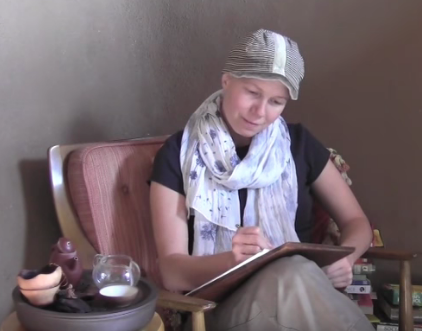 For me, this starts with gratitude for the chance to be alive right now. This is it. This is the edge of humanity’s story, where our collective hand has touched the pen of our actions to the page of our present. What story will we write together?
For me, this starts with gratitude for the chance to be alive right now. This is it. This is the edge of humanity’s story, where our collective hand has touched the pen of our actions to the page of our present. What story will we write together?
I’m looking forward to the tale. I’m glad to be a part of it. I’m grateful to be here, alive, with you. May we live full, lively, unexpected, adventurous lives together.
Love, Rivera
PS I’m also grateful for your support of my health, writing, and the new novel The Roots of Resistance, through our Community Publishing Campaign. Practical gratitude, I know, but no less sincere and heartfelt! Love, Rivera
November 19, 2017
You + Me = We Publish Great Books
Can a story change the world? Yes. Here’s how…
(Plus! Here’s your chance to get a free copy of The Way Between!)
Folktales. Fairy tales. Old wives’ tales. Your support of the Community Publishing Campaign has gotten my creative juices flowing. I’ve been writing the Stories of the Third Brother in my morning writing sessions. These are the folktales of Ari Ara’s world in The Way Between. They are powerful stories – so powerful that the warmongers suppressed them for hundreds of years.
The Stories of the Third Brother are a set of tales about Alaren, the younger brother of two argumentative and warring founders of the embattled countries. His brothers, Marin and Shirar, are constantly “ disturbing the peace” and Alaren is forever trying to work for peace and justice using nonviolent action, negotiation, cleverness, noncooperation, peacebuilding and so much more. Researching for these stories brought me back to real life stories of people who have done this – the Women of Liberia’s Mass Action for Peace, the Christmas Day Ceasefire, the peacebuilding efforts at the River Phoenix Center for Peacebuilding in Gainesville, FL, and the Afghan Peace Volunteers are just some of the many examples that are offering me inspiration.
disturbing the peace” and Alaren is forever trying to work for peace and justice using nonviolent action, negotiation, cleverness, noncooperation, peacebuilding and so much more. Researching for these stories brought me back to real life stories of people who have done this – the Women of Liberia’s Mass Action for Peace, the Christmas Day Ceasefire, the peacebuilding efforts at the River Phoenix Center for Peacebuilding in Gainesville, FL, and the Afghan Peace Volunteers are just some of the many examples that are offering me inspiration.
Since the Stories of the Third Brother are folktales, I am also reading folktales from around the world. This has been an eye-opening experience. You probably have heard about the #metoo campaign, in which women are speaking up about sexual abuse and assault, and, more generally about misogyny and patriarchy. As I’ve been reading old European folktales and fairy tales, I’ve been stunned by how frighteningly misogynistic and violent these stories are, involving frequent femicides of step-sisters, step-daughters, step-mothers, young girls, old women, and also portrayals of old women as evil witches.
This is not a mistake. Many of these stories were written down, told, or adapted after the sixteenth and seventeenth centuries’ witch hunts, persecution of women, and overall subjugation of women in an increasingly patriarchal society. They reinforce the era’s views on “good” and “evil” women. Good women are rewarded by marrying (often into money or royalty) and evil women die horrible deaths. The murder of women happens casually and frequently.
after the sixteenth and seventeenth centuries’ witch hunts, persecution of women, and overall subjugation of women in an increasingly patriarchal society. They reinforce the era’s views on “good” and “evil” women. Good women are rewarded by marrying (often into money or royalty) and evil women die horrible deaths. The murder of women happens casually and frequently.
Why does this matter in 2017?
Because the echoes of these stories are still running around causing harm to women and men. Just as Ari Ara’s world in The Way Between is caught up in one horrific war after another because, long ago, all the stories of peace and nonviolence were banned; so too is our world repeating and reliving old stories of violence, injustice, and oppression.
We need new stories. That’s what I’m comm itted to. From The Dandelion Insurrection to The Roots of Resistance to The Way Between, every story I write draws inspiration from real life stories of the emerging epic of nonviolent action. I write fictional novels and stories that inspire us to embody these kinds of heroes and sheroes. Our world is in the painful, awkward, scary, exhilarating process of evolving. We need to let go of old stories and tell tales that offer us role models for what’s coming and how we’re going to get there.
itted to. From The Dandelion Insurrection to The Roots of Resistance to The Way Between, every story I write draws inspiration from real life stories of the emerging epic of nonviolent action. I write fictional novels and stories that inspire us to embody these kinds of heroes and sheroes. Our world is in the painful, awkward, scary, exhilarating process of evolving. We need to let go of old stories and tell tales that offer us role models for what’s coming and how we’re going to get there.
That’s what my work as a writer is all about. Actually, that’s what our work together in the Community Publishing Campaign is all about.
You + Me = We make these stories possible.
Thank you.
Okay … here’s how to get a free book! O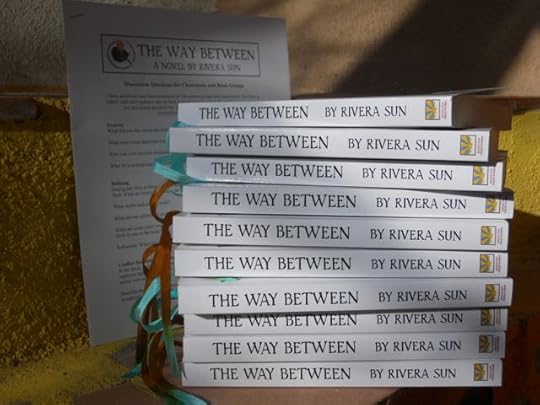 n Monday (November 20th) night, we’re going to put all the names of all the supporters of the Community Publishing Campaign into a hat (probably my notorious striped cap) and draw names to win a free copy of the limited Author’s Edition of The Way Between. I have nearly 20 copies to give away, so you stand a great chance of getting one! Here is where to support the Community Publishing Campaign: https://www.indiegogo.com/projects/the-roots-of-resistance#/
n Monday (November 20th) night, we’re going to put all the names of all the supporters of the Community Publishing Campaign into a hat (probably my notorious striped cap) and draw names to win a free copy of the limited Author’s Edition of The Way Between. I have nearly 20 copies to give away, so you stand a great chance of getting one! Here is where to support the Community Publishing Campaign: https://www.indiegogo.com/projects/the-roots-of-resistance#/
Here’s to the courageous work of changing the world stories!
Rivera
November 16, 2017
Fling Back Despair! Kindle the Flame of Hope!
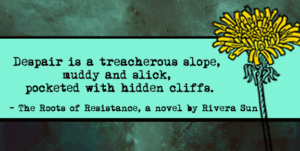 Note: The sequel to The Dandelion Insurrection is here! The Roots of Resistance is available through our Community Publishing Campaign: https://www.indiegogo.com/projects/the-roots-of-resistance#/
Note: The sequel to The Dandelion Insurrection is here! The Roots of Resistance is available through our Community Publishing Campaign: https://www.indiegogo.com/projects/the-roots-of-resistance#/
Despair rides in front of our opposition, an invisible wind that blows like plague through our hearts. Here, our stand begins. Moment-by-moment, day-by-day, we must keep despair at bay in the siege waged by the forces of destruction and greed.
I have written about the three treasures – courage, hope, and joy – and how the foes of life and love seek to steal or destroy them. Guard the three treasures well. Thieves come in the guises of both friends and enemies. Without courage, hope, and joy, despair can crumble the strongest to their feet. It can cripple the smartest minds. It can weaken the boldest hearts. It spreads, infectious, from one person to the next, until the whole of a populace sinks to its knees, and the armies of greed and destruction trample over us.
Here is how to thwart despair and deny this invisible fiend any toehold in your heart: first, collect stories of the good, the kind, the loving, and the hopeful. Gather them in the storehouse of your mind. When despair begins to sneak in through the cracks in your hope, hold up these stories to push back. Remember the examples of successes and victories. Think about people who made change when it all seemed impossible. Invoke the characters both historic and living that continue to inspire you in your own life. Borrow strength from the tangible, honest stories of sheer goodness: people who care for the weak, the laughter of children, the taste of a humble bowl of soup. Collect gentle balms like the blossoms of flowers, the sound of a stream, the swoop of a bird’s flight, the sunlight dancing through trees. Hold all of these in your heart for the times when you need the reminder that life is worth the challenges we face.
And, in those times when the smothering fog of despair dampens the kindle of hope, then we must sing out love in the midst of the darkness. If the shape of our love begins in sorrow, so be it, let it flow out, and reach deeper. Beneath the sadness is usually something extraordinary: a powerful love for each other and this earth. Sometimes, the song of our love comes out in quiet presence, and simple hum of existence, a reassurance that we are here and alive in one another. Other times, our love sings in a fierce determination, a resurrection song that refuses to give up. Sing out your love in whatever its shape, so that others may hear and lift up their voices with yours. Dare to love this world and each other in all of our uncertainty, all of our brokenness, all of our humanness. Where love stands, despair retreats. In that space, we find the strength to move forward.
We can also raise up the vision of the world we seek, even when despair howls that it will never come to be. We must lift up that vision, blazing, in the dark night. We must dare to believe in the world that we envision, to speak of it, share it with others, and remind one another of its beauty. This takes courage, but it is courage well spent, for a single torch of vision can illuminate the ground beneath our feet. And when you touch the flame of your vision to the extinguished torch of a friend, and she to her neighbor, and he to his companion, and so on – until we are all standing as a thousand, ten thousand, one million points of light – then the entire slope of the mountain gleams. The path emerges beneath us. Despair is flung back. We rise and move forward, up to the mountaintop. And the dawn of change greets us, brighter than a billion torches of hope, rising over the very world we dared to dream of when the night seemed too dark, and the slope seemed too steep, and despair weighed on us too heavy to bear.
So, do this work, my friends. Fortify your hearts. Build up your ability to thwart despair. See it as yet another assault from the forces of destruction, and refuse to surrender so easily to them. Train in these practices. Apply them as despair creeps closer. Teach them to others. Together, we will light up the mountainside and climb onward to the world we envision.
______________
The Man From the North is a fictional writer in Rivera Sun’s novel, The Dandelion Insurrectio n. The novel takes place in the near future, in “a time that looms around the corner of today”, when a rising police state controlled by the corporate-political elite have plunged the nation into the grip of a hidden dictatorship. In spite of severe surveillance and repression, the Man From the North’s banned articles circulate through the American populace, reporting on resistance and fomenting nonviolent revolution. This article is one of a series written by The Man From the North, which are not included in the novel, but can be read here .
Author/Activist Rivera Sun , syndicated by PeaceVoice , is the author of The Dandelion Insurrection and has just launched the sequel, The Roots of Resistance.
November 12, 2017
You. Are. Amazing. A Good News Letter from Rivera Sun
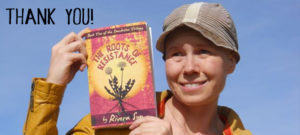 You. Are. Amazing.
You. Are. Amazing.
It takes vision, love, and courage to change the story of our times.
You’ve got it all. Thank you.
Wow. I am blown away by the response to The Roots of Resistance’s Community Publishing Campaign. In two days, we are thirty percent funded, which reflects the incredible generosity, love, and vision of readers and friends far and wide. Thank you. I am moved deeply by this. It gives me hope for our world. If you haven’t jumped in yet, and are ready to be a part of this beautiful happening, here’s where to find our Community Publishing Campaign:
https://www.indiegogo.com/projects/the-roots-of-resistance/x/4376219#/
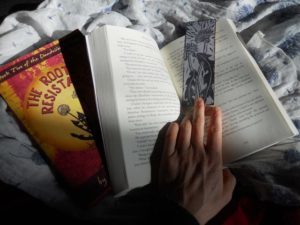 The powerful outpouring of support affirms that these stories are part of the change we’re all seeking to make, bringing our selves, our families, and our communities into more caring and compassionate stances, using nonviolent action and peacebuilding to stand up for one another and this beloved Earth. Despite the daily news, I see the signs that people like us are the dandelions: bold, indomitable, persistent, springing up through the concrete of control, and letting our hearts lead. This is the truth that I write into my fiction. You will see this beauty woven throughout The Roots of Resistance. It is inspiring. It is uplifting. It’s exactly what we need right now.
The powerful outpouring of support affirms that these stories are part of the change we’re all seeking to make, bringing our selves, our families, and our communities into more caring and compassionate stances, using nonviolent action and peacebuilding to stand up for one another and this beloved Earth. Despite the daily news, I see the signs that people like us are the dandelions: bold, indomitable, persistent, springing up through the concrete of control, and letting our hearts lead. This is the truth that I write into my fiction. You will see this beauty woven throughout The Roots of Resistance. It is inspiring. It is uplifting. It’s exactly what we need right now.
You may have noticed: stories are powerful. They can hearten us, inspire us, offer us courageous examples, move us to tears of love and joy. And, while there are tons of media, books, and movies churning out relentless scary news of what’s going on, there are far too few stories of the other side of the picture. People are engaged in creative, loving acts of kindness all over this country. They are organizing together, stepping up to be the change we want to see in the world, taking unprecedented stands based on the demands of their conscience.
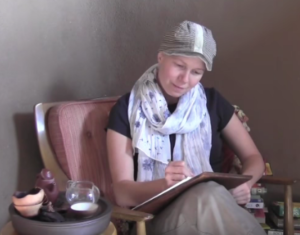 These are the people I write about. The Roots of Resistance features characters and scenes loosely based on true stories – like the nation’s first nonviolent public school in Rhode Island, the incredible organizing of the Danes against the Nazis, the French Acadian tintamarre bells-and-whistles proclamation of existence, Indigenous wisdom for change as embodied by a character based on my friend Sherri Mitchell, and so much more. (I could go on, but there would be spoilers amidst the dozens of things I drew from inspiring true stories!)
These are the people I write about. The Roots of Resistance features characters and scenes loosely based on true stories – like the nation’s first nonviolent public school in Rhode Island, the incredible organizing of the Danes against the Nazis, the French Acadian tintamarre bells-and-whistles proclamation of existence, Indigenous wisdom for change as embodied by a character based on my friend Sherri Mitchell, and so much more. (I could go on, but there would be spoilers amidst the dozens of things I drew from inspiring true stories!)
This Community Publishing Campaign is reminding all of us of the truth that resistance is more than protesting injustice . . . it is also working together to bring new stories into the world, to tell them to one another, to share books like The Dandelion Insurrection and The Roots of Resistance, to publish stories that offer role models like Charlie Rider, Zadie Byrd Gray, Inez Hernandez, Tansy Beaulisle, Tucker Jones and more. We are these characters in real life – and these characters grow in us like the golden blossoms of these stories.
Thank you for your belief. Thank you for being the change. Thank you for bringing stories like this to thousands. Yes, we’re actually reaching many thousands of people now with The Dandelion Insurrection . . . and with your help, we’ll go even further with The Roots of Resistance.
Get a copy of the book for you and for friends. Support the whole year of great writing (see the Community Publishing Campaign to find out how much more is coming up – it is truly amazing) and remember to enjoy this moment of community celebration. It is a moment to rekindle to love and faith in our hearts.
Find the Community Publishing Campaign here:
https://www.indiegogo.com/projects/the-roots-of-resistance#/
In gratitude, joyful tears, and deep love,
Rivera
From the Desk of Rivera Sun
- Rivera Sun's profile
- 161 followers



